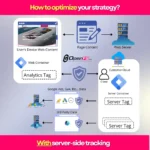How Can AI Improve SEO Performance? Understanding the Digital Revolution
I’ve been in the digital marketing game long enough to remember when SEO meant stuffing keywords into every corner of your website and crossing your fingers. Those days are long gone, and honestly, good riddance. Today’s SEO landscape is smarter, more sophisticated, and increasingly powered by artificial intelligence. If you’re wondering how AI can improve SEO performance for your business, you’re asking the right question at the right time.
The truth is, many business owners I talk to in New Jersey and beyond feel overwhelmed by the constant changes in search algorithms. They’re pouring money into websites that feel invisible, spending countless hours creating content that doesn’t convert, and watching competitors zoom past them in search rankings. Sound familiar? Here’s the thing – AI isn’t just another tech trend to worry about. It’s actually the solution to many of these frustrations.
Why AI and SEO Are Now Inseparable Partners
Let me paint you a picture of what’s really happening in the SEO world right now. Google processes over 8.5 billion searches daily, and their algorithms are getting smarter by the minute. They’re not just looking at keywords anymore – they’re understanding context, user intent, and even predicting what searchers really want before they finish typing. This complexity means traditional SEO tactics alone won’t cut it anymore.
AI technologies have become the bridge between what search engines want and what businesses can realistically deliver. These smart systems can process massive amounts of data, spot patterns humans would miss, and make predictions that would take our brains weeks to figure out. For small business owners especially, this isn’t just convenient – it’s becoming essential for survival in the digital marketplace.
The Real-World Impact of AI-Powered Search Optimization
When you implement AI-driven SEO strategies correctly, the results can be transformative. I recently worked with a local New Jersey contractor who was skeptical about AI tools. Within six months of implementation, they reduced their content creation time from 15 hours weekly to just 3 hours, while their organic traffic jumped by 78%. That’s not magic – that’s smart technology working alongside human expertise.
The benefits extend far beyond time savings. AI-enhanced SEO can significantly reduce your marketing costs by automating repetitive tasks, increase qualified traffic through laser-focused targeting, and improve conversion rates with data-backed optimization. Plus, you’ll finally have clear ROI tracking that shows exactly what’s working and what isn’t. This creates a sustainable competitive advantage that grows stronger over time.
7 Game-Changing Ways AI Can Transform Your SEO Results
Now let’s dive into the practical stuff – exactly how AI can improve SEO performance across different aspects of your digital presence. These aren’t theoretical concepts; they’re strategies I’ve seen work for businesses just like yours.
1. Revolutionizing Keyword Research and Content Strategy
Remember spending hours trying to guess what keywords your customers might use? AI has completely transformed this process. Modern AI-powered tools analyze search intent patterns across thousands of related queries, identify semantic relationships between topics in your industry, and even predict emerging keyword trends before your competitors catch on.
What really excites me is how these tools group keywords by buyer journey stage. This means you’re not just finding keywords – you’re understanding exactly where your potential customers are in their decision-making process. This deeper insight helps you create content that truly resonates with their needs at each stage.
2. Content Optimization That Actually Works
Creating content that ranks well while engaging readers has always been a balancing act. AI content optimization tools have mastered this balance by analyzing top-performing content in your niche to identify winning patterns. They suggest optimal content structure, headings, and subtopics based on what’s actually working in your industry.
These tools go beyond basic keyword density checks. They recommend semantic keywords for comprehensive topic coverage and provide readability suggestions alongside SEO recommendations. The result? Content that satisfies both search engines and human readers – the holy grail of modern SEO. Our search engine optimization services leverage these AI capabilities to create content that works harder for your business.
3. Technical SEO on Autopilot
Technical SEO issues can tank your rankings faster than you can say “404 error.” AI-powered technical SEO tools act like vigilant guardians, continuously monitoring your site for problems like broken links, slow loading pages, and mobile optimization issues. But here’s where it gets really smart – these tools prioritize fixes based on their likely impact on rankings.
They can automatically generate structured data markup (that’s the code that helps search engines understand your content better) and even predict the SEO impact of technical changes before you implement them. This proactive approach prevents small issues from snowballing into major ranking disasters. For more insights on this, check out our guide on technical SEO fundamentals.
Dominating Local Search with AI-Powered Strategies
For businesses serving specific geographic areas, local SEO presents unique challenges and opportunities. This is where AI really shines, especially for New Jersey businesses competing in crowded local markets.
4. Smart Local Search Optimization
AI tools have revolutionized local SEO by analyzing competitor strategies and identifying gaps you can exploit. They monitor and manage your Google Business Profile with automated updates and even suggest responses to customer reviews. These systems track local ranking factors across multiple locations and generate location-specific content recommendations based on actual local search patterns.
I recently saw an automotive repair shop in central New Jersey implement AI-driven local SEO strategies. Within three months, they experienced a 210% increase in “near me” searches, which directly translated to more walk-in customers. That’s the power of AI understanding and optimizing for local search intent. Learn more about local SEO strategies for New Jersey businesses.
5. User Experience Optimization Through Intelligent Analysis
Google now considers user experience signals as ranking factors, and AI excels at optimizing these metrics. By analyzing user behavior patterns, AI can identify friction points that cause visitors to leave your site. It recommends personalized content based on user segments and can test multiple page variations automatically to find what performs best.
What’s really impressive is how AI predicts the impact of UX changes on conversion rates before you implement them. This approach to conversion rate optimization ensures your site not only ranks well but also turns visitors into customers more effectively.
Creating Synergy: AI Across Your Digital Marketing Ecosystem
SEO doesn’t exist in a vacuum – it works best when integrated with your overall digital marketing strategy. AI excels at creating these connections and amplifying results across channels.
6. Supercharging Content Creation and Distribution
AI has transformed how we approach content marketing. These tools can generate content outlines based on competitor analysis, create first drafts that capture key points (which you then refine with your expertise and brand voice), and suggest optimal publishing schedules based on when your audience is most active.
The real game-changer is automated content distribution across channels with customized messaging for each platform. This dramatically reduces the time investment required for content marketing while improving quality and consistency. When combined with professional web design and development, this creates a powerful foundation for organic growth.
7. Predictive Analytics for Staying Ahead
Imagine knowing which SEO strategies will work before investing time and money in them. AI makes this possible through predictive analytics. These systems identify emerging ranking factors before they become mainstream, forecast seasonal traffic patterns specific to your industry, and predict which content topics will gain relevance in coming months.
They can even estimate the potential ROI of different SEO initiatives before you invest. This transforms SEO from a reactive scramble to a proactive strategy, giving you a significant advantage over competitors still using traditional approaches. For more on this, explore our insights on AI-powered SEO strategies.
Finding the Sweet Spot: Balancing AI and Human Expertise
Here’s something important to understand – AI isn’t about replacing human creativity and judgment. The most successful SEO strategies combine the best of both worlds. Think of AI as your incredibly smart assistant who handles the heavy lifting while you focus on strategy and creativity.
When to Let AI Take the Wheel vs. Keeping Human Hands on Deck
AI absolutely excels at data analysis and pattern recognition. It’s unbeatable for repetitive tasks like technical audits and monitoring, generating insights from massive datasets, and testing multiple variables simultaneously. Let AI handle these tasks – it’ll do them faster and more accurately than any human could.
However, human expertise remains irreplaceable for strategic decision-making and prioritization. Your brand voice, storytelling ability, and deep understanding of customer needs can’t be replicated by algorithms. Building authentic relationships with your audience still requires that human touch. The businesses seeing the greatest success are those maintaining this balance – using AI for data-heavy tasks while applying human creativity to strategic decisions.
Your Roadmap to Implementing AI-Enhanced SEO
Ready to harness AI to improve your SEO performance? Let me walk you through a practical implementation plan that actually works.
Step 1: Know Where You Stand
Before diving into AI tools, you need a clear picture of your current performance. Document your current ranking positions for key terms, organic traffic volumes and patterns, conversion rates from organic traffic, technical SEO health score, and content gaps compared to competitors. This baseline becomes your measuring stick for AI’s impact and helps identify where to focus first.
Step 2: Start Smart with Quick Wins
Don’t try to revolutionize everything at once. Begin with high-impact, low-complexity applications. Start with keyword research and content gap analysis – AI tools can quickly identify valuable opportunities you’re missing. Set up technical SEO monitoring to catch issues before they hurt your rankings. Focus on optimizing existing content, which often yields faster results than creating new pages from scratch.
These initial applications generate quick wins while you build familiarity with AI-enhanced approaches. Success breeds confidence, and you’ll soon be ready for more advanced implementations.
Step 3: Connect SEO with Paid Search for Maximum Impact
Here’s where things get really interesting. AI insights from your SEO efforts can supercharge your paid search campaigns too. Use AI to identify high-converting keywords from organic search to target in paid campaigns. Leverage natural language processing to craft more effective ad copy. Optimize landing pages based on organic search performance data, and create more precise audience targeting based on organic visitor behavior.
This integration creates powerful synergy between your search engine marketing and SEO efforts, amplifying your overall digital marketing performance.
Overcoming Common AI Implementation Challenges
Let’s be real – implementing AI for SEO isn’t always smooth sailing. But knowing the potential pitfalls helps you navigate around them.
Challenge 1: Garbage In, Garbage Out
AI systems are only as good as the data they work with. Common issues include incomplete analytics setups leading to data gaps, historical data that doesn’t reflect current business priorities, and difficulty integrating data from multiple platforms. The solution? Start with a comprehensive data audit and cleanup before implementing AI tools. Make sure your analytics properly track all relevant user interactions. Clean data leads to smart insights.
Challenge 2: Keeping Your Brand Voice Authentic
AI-generated or optimized content can sometimes sound robotic or generic. Nobody wants to read content that feels like it was written by a machine. The solution is simple – use AI for structure and optimization guidance, but always have human editors review content for brand voice consistency and authentic expertise. AI should enhance your voice, not replace it.
Challenge 3: Tool Overload and Integration Headaches
The AI SEO tool landscape is exploding with new options daily. It’s easy to get overwhelmed or end up with a dozen different tools that don’t play nicely together. Start with versatile platforms that integrate multiple AI capabilities rather than adopting numerous single-purpose tools. This simplifies your tech stack while still providing powerful capabilities.
The Future of AI in SEO: Preparing for What’s Next
The AI revolution in SEO is just getting started. Understanding emerging trends helps you prepare for tomorrow’s opportunities today.
Multimodal Search and Visual SEO Evolution
Search engines are getting better at understanding images, videos, and audio content. Future AI tools will help optimize all types of media for search visibility. This creates new opportunities to rank for visual and voice searches, opening doors to audiences you couldn’t reach before.
Hyper-Personalized Search Experiences
Search results are becoming increasingly personalized based on user context and history. AI will become essential for understanding how different user segments experience search and optimizing accordingly. This means creating content strategies that adapt to individual user needs rather than one-size-fits-all approaches.
Real-Time SEO Adaptation
Forget monthly SEO reviews – the future is continuous optimization. AI will enable real-time responses to algorithm changes, competitor movements, and user behavior shifts. Businesses that build this adaptive capability now will have a massive advantage as search continues to evolve. Dive deeper into adapting to AI-driven search.
Taking Action: Your AI-Enhanced SEO Journey Starts Now
The question isn’t whether AI can improve SEO performance anymore – it’s how quickly you can implement these strategies in your business. For small business owners and entrepreneurs, especially in competitive markets like New Jersey, AI levels the playing field against larger competitors.
AI enables you to make data-driven decisions without becoming a data scientist, automate time-consuming SEO tasks so you can focus on running your business, achieve more predictable results from your digital marketing investments, and build a foundation for long-term visibility while generating short-term wins.
The businesses that will thrive aren’t necessarily those with the biggest budgets, but those that smartly combine AI capabilities with human creativity and strategic thinking. By understanding how AI can improve SEO performance and implementing it thoughtfully, you’re not just keeping up – you’re positioning your business for sustainable growth in an increasingly digital world.
Frequently Asked Questions
How does AI improve keyword research for SEO?
AI transforms keyword research by analyzing massive datasets to uncover search intent patterns, predict emerging trends before they become competitive, and strategically group keywords based on where users are in their buying journey. This results in more targeted content strategies that actually connect with what your audience is searching for.
Can AI completely replace human SEO experts?
No, AI can’t replace human SEO experts entirely. While AI excels at data crunching and automation, human expertise remains crucial for strategic planning, understanding subtle customer needs, and maintaining your unique brand voice. The best results come from combining AI’s analytical power with human creativity and judgment.
What are the main challenges of implementing AI in SEO?
The biggest challenges include ensuring your data is clean and accurate (AI needs good data to work properly), maintaining your authentic brand voice in AI-optimized content, and choosing the right tools from an overwhelming marketplace. Success requires careful planning and a balanced approach that combines AI capabilities with human oversight.
How can small businesses benefit from AI-driven SEO?
Small businesses can level the playing field with AI-driven SEO by automating time-consuming tasks, making sophisticated data-driven decisions without hiring a team of analysts, and competing more effectively with larger companies. AI helps optimize your digital presence more efficiently, letting you focus on what you do best – running your business.
What future trends should businesses prepare for in AI and SEO?
Key trends to watch include multimodal search optimization (think visual and voice search), hyper-personalized search experiences tailored to individual users, and real-time SEO adaptation that responds instantly to changes. Preparing for these trends now will give you a significant competitive advantage as the digital landscape continues to evolve.
 Written by: Romulo Vargas Betancourt
Written by: Romulo Vargas Betancourt
CEO – OpenFS LLC







